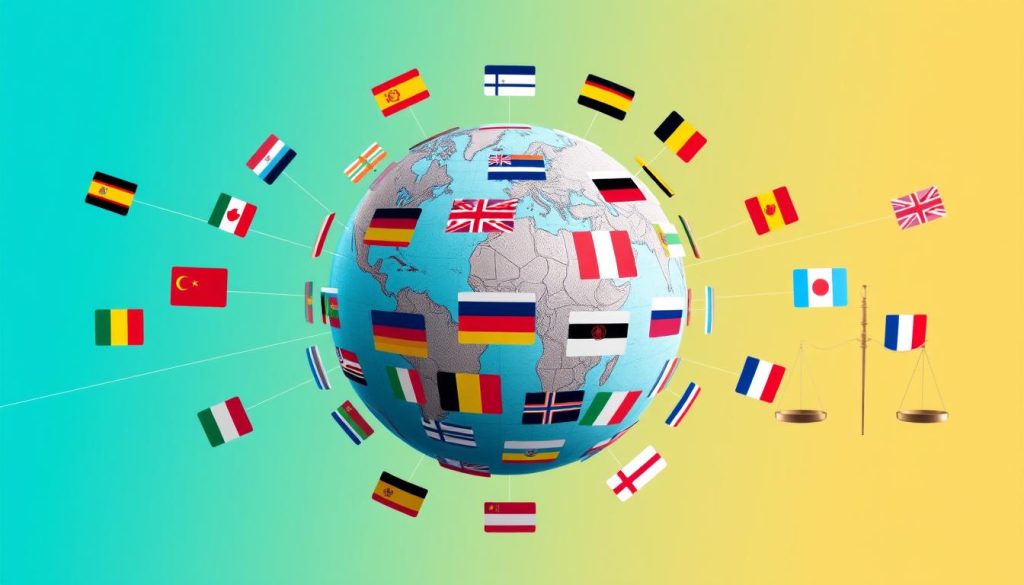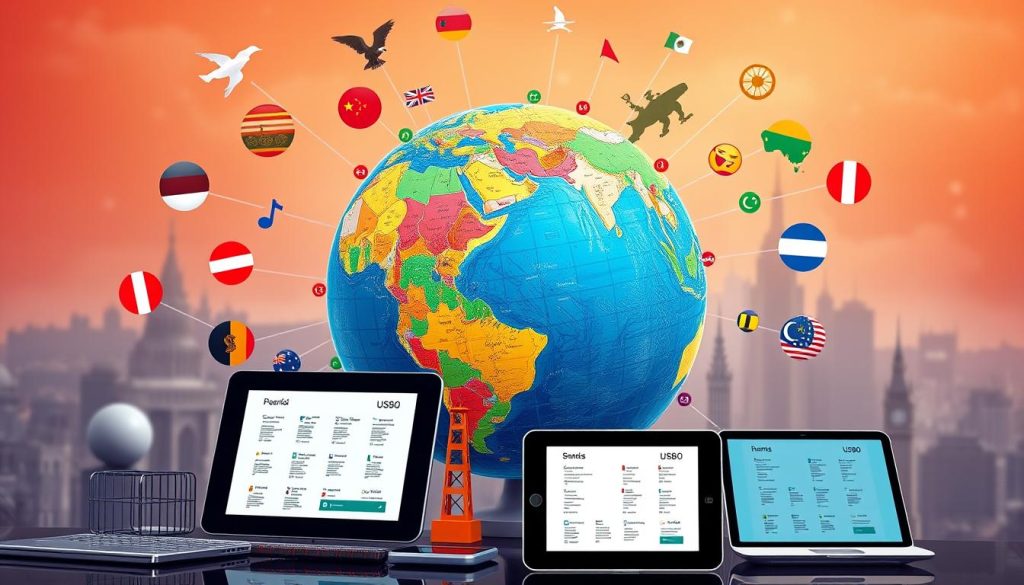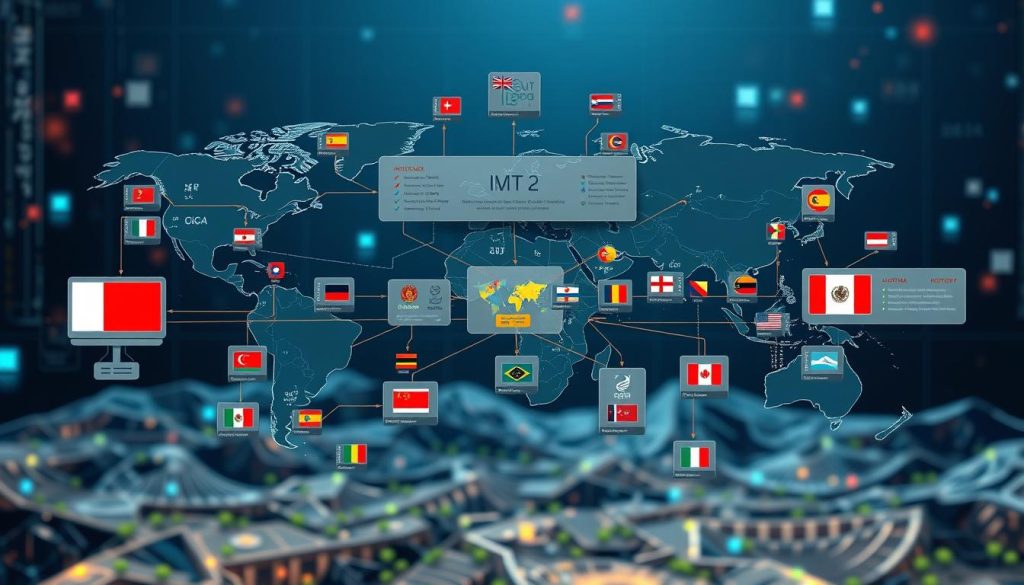Businesses are now aiming to grow beyond their home countries. Having a global SEO strategy is key for their international growth. With an online world, international business SEO is essential, not just an option. It’s about making a brand known worldwide, despite cultural and geographical differences.
SEO for global markets is more complex than just translating websites. It requires analyzing each region’s specific search engines, how users behave, and what competitors do. By tailoring SEO for each audience, businesses can build a strong global presence. They can achieve growth and recognition across the globe.
Let’s explore how detailed SEO strategies can shape a global brand. We’ll see the benefits of connecting with a worldwide audience digitally.
Understanding the Fundamentals of Global SEO Strategy

Today, for businesses wanting to grow internationally, it’s key to get global SEO right. In this part, we explore the essential elements for entering the global SEO market. We’ll show how to use international SEO methods well.
Firstly, it’s important to know how search engines are used differently around the world. Google is the top choice worldwide. Yet, we can’t ignore local search engines such as Baidu in China, or Yandex in Russia. They all have their own rules and user habits, so a personalised plan is needed.
- Cultural differences greatly influence SEO tactics. Successful strategies vary by country due to language, culture, and search preferences.
- The core of a solid SEO plan is technical SEO. It makes websites load fast everywhere and work well on phones for audiences worldwide.
- On-page SEO should be adjusted for local languages and searches. It’s about finding the right local keywords without losing your brand’s unique voice.
- Building local backlinks, or off-page SEO, greatly helps raise your site’s authority. It makes you more visible in new places.
Besides, a smart global SEO strategy must think about laws and rules in different areas. Privacy and data protection laws, along with local ad rules, play a big role. You need to consider these in your international SEO plan.
With a strong grasp of international SEO, businesses can overcome challenges in the global market. They can make a big impact online in new areas. By focusing on culture, technology, and law, firms can grow their reach globally. They’ll also connect better and win over customers in each new market.
The Importance of Cultural Sensitivity in International SEO

Understanding and using cultural sensitivity in global SEO is crucial. It matters a lot when your online presence reaches across borders. This section shows how blending cultural sensitivity with SEO boosts your impact globally.
Incorporating Local Customs and Preferences
Entering new markets means learning local SEO traditions. This knowledge can change how people see your brand. Here’s what you could do:
- Learn about local holidays, traditions, and shopping habits to better plan your marketing.
- Make your website’s look and content reflect local tastes and values.
- Work with local influencers who get the culture and can spread your message well.
These steps improve your SEO abroad and help you connect with local customers.
Overcoming Language Barriers with Multilingual SEO
Multilingual SEO is key for reaching out internationally. It makes sure your content speaks to different language speakers. To do this, you should:
- Offer language choices on your website, so visitors can pick what they prefer.
- Include local language keywords to show up in searches in different areas.
- Make sure translations fit the cultural context, not just word-for-word.
Adopting these methods helps get past language obstacles that can block international interactions and conversions.
The Role of Keywords in Expanding Your Business Internationally

Thriving in international markets requires smart keyword research for international markets. It is key to success. The right global SEO keyword optimization draws relevant traffic that converts well. This article discusses how international keyword targeting differs from local SEO work.
Keyword research for global markets goes beyond translating domestic phrases. It involves understanding cultural differences, search habits, and language specifics. These factors affect how international users search online.
- Local Search Habit Analysis: By studying search trends locally, businesses can learn what consumers seek and how they phrase their searches. This sharpens targeting strategies.
- Keyword Relevance: Since regional dialects vary, a keyword that works in one place might fail elsewhere. Recognizing keyword relevance is crucial for content success.
- Translation and Colloquialisms: Simply translating keywords often fails. Using local slang makes search results more natural and engaging for the audience.
Mastering global SEO keyword optimisation means more than reaching a broad audience. It’s about making meaningful connections with different cultural groups. Using strategic international keyword targeting addresses each market’s unique needs. This approach improves engagement and conversion rates globally, boosts visibility, and builds trust with international customers.
Optimising Your International Website for Different Search Engines

When you’re looking at international SEO, it’s key to know the role of different global search engines. Google isn’t the only player; there are also region-specific engines like Baidu in China and Yandex in Russia. These engines have huge user bases and need special SEO tactics.
Why Google Isn’t the Only Player Abroad
Across the globe, the digital world changes a lot from one place to another. This makes it important to use a variety of search engines in international markets. Local engines often get regional languages and subtleties better. They give more accurate search results, winning over many local users.
Adapting SEO Practices for Baidu, Yandex, and Other Search Engines
To tailor your SEO for engines like Baidu and Yandex, you need to know their specific SEO rules. For Baidu, you must work with Mandarin Chinese and follow China’s strict internet rules. For Yandex, adjust your content and keywords for users in Russian-speaking areas.
- An in-depth analysis of keyword relevance specific to culture and language.
- Technical SEO customisations such as TLDs (.cn, .ru) and local hosting considerations.
- Creating content that suits local tastes, preferences, and seasonal trends.
By understanding and adapting to different search engines, you can greatly boost your website’s international appearance and success.
Building a Globally Resonant Brand Through SEO

Today’s digital economy demands a strong global brand presence. By using international SEO branding strategies, businesses can create a brand image loved by various markets. This segment will look at how to boost your brand’s global appeal and success.
Creating a Consistent Brand Image Across Borders
Keeping your brand consistent worldwide is key. You must tweak your message to fit local cultures while keeping your brand’s core values. Here’s how:
- Keep your visual elements consistent but tweak your message to suit local tastes and preferences.
- Adopt an international SEO branding plan to make sure your brand connects well in different areas.
- Utilise regional customer feedback to customise your strategy, making it more relevant and engaging.
The Power of International Link Building
Link building across borders can greatly boost your global brand. Creating links with respected sites in various regions can help you:
- Raise your website’s authority and make it more visible on various search engines.
- Attract visitors from all over the world, widening your customer base.
- Form alliances with international influencers and companies, promoting mutual growth and brand recognition.
Putting these strategies into action needs careful planning and implementation. Doing so can significantly aid in achieving your goals of global market penetration. By enhancing your brand presence globally through SEO and international link building, you not only grow your reach but also sharpen your edge in the global market.
SEO For International Business Formation

Expanding your business abroad comes with both challenges and opportunities. Companies need tailored SEO services to grow globally. It’s essential to grasp the complexities of each market. Using specialized global SEO consultancy can greatly help in succeeding.
- Analysing markets with SEO tools to spot demand across regions
- Creating content that appeals to the local audience
- Making technical SEO tweaks so search engines can find the website easily
Using precise SEO techniques raises visibility in new areas and builds a strong, local online presence. This method, supported by skilled global SEO consultants, makes entering international markets both smooth and strategic.
To compete globally, companies must have a detailed SEO plan that tackles the nuances of different areas. This means not just translating content, but also embracing local cultures and search trends to boost visibility and connect with users.
With expert advice, businesses can succeed in new places by making choices informed by data and customized SEO strategies for each location’s unique requirements.
Legal Considerations and Compliance in International SEO

Expanding your business worldwide means you must understand and follow international SEO rules. If not, your company may face big fines and harm its global reputation.
In different countries, laws on data protection, copyright, and advertising can affect your SEO strategies. These aren’t just advice but mandatory rules for success in international markets.
- Data Protection and Privacy: Countries have strict rules like the GDPR in the EU for handling personal data.
- Copyright Laws: Your content must respect local intellectual property laws to avoid legal trouble and honour copyright.
- Advertising Standards: Different countries have various advertising laws, especially online, affecting marketing strategies.
SEO experts need to know these laws well to make sure their digital marketing is both effective and legal.
By keeping up with SEO laws, you protect your business from legal issues and keep your brand respected worldwide. Regular checks and advice from legal experts in this field are very important.
The main goal is to respect these laws, not just to avoid fines. Doing so builds trust with international audiences, boosts brand loyalty, and grows your business.
Localising Content for Global Markets

In our connected world, creating global content isn’t just about translating. It’s about understanding cultural differences and consumption habits. By adopting thorough content localisation, brands become relatable across various regions. This method improves SEO and makes a brand relevant worldwide.
Understanding the Nuances of Content Localisation
Localisation means more than translating. It involves cultural sayings, holidays, and events. The goal is to connect culturally, not just linguistically. Adding cultural details into SEO is crucial for this connection.
- Adjusting the content calendar to align with local festivals or significant dates.
- Using region-specific examples and case studies to illustrate points more vividly.
- Incorporating local slang and phrases to make the content more relatable and engaging.
SEO and the Impact of Cultural Differences on Content Strategy
The blend of SEO and cultural differences shapes effective global marketing. Knowing how cultural nuances affect branding can boost international visibility and engagement. This requires special attention to:
- Optimising for local search engines that dominate in specific regions, beyond just Google.
- Adapting keyword strategies according to what resonates culturally in each region.
- Customising visual content to reflect regional tastes and preferences.
A solid global content strategy does more than just translate – it revolutionises. It’s about respecting each market’s cultural context. This approach doesn’t just spread the message. It ensures deep, meaningful engagement with audiences worldwide, enhancing both local presence and global brand awareness.
Leveraging Social Media for International Audience Engagement

An effective social media strategy is vital for connecting with people worldwide. It involves knowing the popular platforms in different areas and creating content that locals will love. This approach helps make real connections and improves SEO performance.
To best engage an international audience on social media, follow these steps:
- Find out which social media sites are big in each area and use them to make your brand feel local.
- Create content that celebrates local culture, holidays, and events to connect with a global audience.
- Keep an eye on what works by checking how people respond and using data to see what attracts them in various places.
Integrating social signals with SEO efforts can hugely increase your brand’s global visibility. The mix of social media engagement and SEO is crucial. It brings not just more visitors but also loyal customers.
- Match your social media posts with SEO keywords for international markets.
- Add content made by users from different areas to make your brand more genuine and improve SEO through local engagement.
- Plan your social media ads to get noticed in new places, making sure they appeal to a wide range of cultures.
For a successful international social media plan, you need a strong understanding of both worldwide digital marketing and the specific details that matter to local buyers. Using this knowledge, brands can create online experiences that truly speak to people all over the world.
Technical SEO: Structuring Your Site for International Audiences

When you aim to make your website global, it’s key to plan carefully. You need to understand different SEO strategies that help you shine internationally. Explore how ccTLDs, hreflang tags, and subdirectory methods can build a strong global site structure.
Country Code Top-Level Domains (ccTLDs) vs. Subdirectories
Choosing between ccTLDs or subdirectories can really impact your worldwide SEO. Let’s look at the benefits and things to consider for each option:
- ccTLDs in SEO: They tell search engines your site is made for a specific country, which might boost local ranks. For example, a .fr domain shows Google your target is France.
- Subdirectory SEO strategy: This method lets you create a special subdirectory for each country or language, like /fr/ or /de/. It’s cheaper than having many domains and keeps your site’s SEO value high by housing all international content together.
Hreflang Tags and Ensuring the Right Content for the Right Region
Using hreflang tags is essential for a worldwide audience. They make sure users see the content that’s best for their language and region. These tags help by:
- Preventing the same content from appearing in different languages on your site.
- Boosting user experience by showing content in the right language, which keeps users engaged and lowers bounce rates.
By combining ccTLDs, subdirectories, and hreflang tags, you get a powerful international site structure. This improves your reach and visibility on search engines.
Analytics and Performance Tracking Across Regions

If your business is global, you really need international SEO analytics. Knowing how people from different places use your site helps make your marketing better everywhere. Cross-regional performance tracking shows which ideas work and which need a rethink. This means you can quickly meet global market needs.
To track and understand global SEO metrics, you need the right tools and methods. Here are some top tips to get better at international SEO analytics:
- Segmentation of Analytics by Region: Break down your data by region. This helps you see what works where. It means you can tweak your plans to fit every market.
- Integration of Local Search Engines: Don’t just use Google Analytics. Add tools from other places like Baidu Tongji in China or Yandex.Metrica in Russia for precise local data.
- Use of Advanced Tracking Tools: Choose high-tech tools. Look for features like heat maps and session recordings to see how different users engage with your site.
Keep an eye on these global SEO metrics to tweak your international efforts. This will make sure you connect well with audiences around the world. It leads to a stronger online presence and happier users.
Developing an International SEO Campaign Budget

Planning and wisely allocating resources are key to successful international SEO. Grasping the various challenges of executing strategies in diverse markets helps. It greatly affects campaign success and the return on the investment.
Allocating Resources for Different Markets
Different markets have their unique sizes, people, and ways users interact with online content. So, international SEO budgets need to consider these differences for better results:
- Assessing market potential and competitive landscapes to allocate budgets commensurately.
- Investing in local SEO expertise to understand regions-specific trends and user behavior.
- Adapting technology and tools that cater specifically to the needs of each target area.
Measuring ROI on Global SEO Investment
It’s crucial to calculate the ROI of global SEO to justify costs and plan future investments:
- Tracking conversions from different regions to evaluate the effectiveness of localised SEO strategies.
- Analyzing engagement metrics and user interaction to gauge content relevancy and impact.
- Comparing pre- and post-SEO implementation performance metrics to determine financial gains.
Common Pitfalls to Avoid in International SEO

International SEO is tricky and full of pitfalls. Making mistakes can throw off your strategy. This guide shows common pitfalls and how to dodge them. It ensures your global strategy works well and efficiently.
- Over-reliance on Automated Translations: Using automated translations might make content wrong or offend culturally. Better to use professional translators and local experts for accuracy and relevance.
- Neglecting Local Search Engines: Google’s big, but not everywhere. Baidu in China and Yandex in Russia are big too. Make sure your SEO strategy fits these local engines.
- Inadequate Localisation: Just translating isn’t enough. Think about local money, measures, dates, and culture to really connect with people.
- Misjudging Keywords: A keyword might be hot in one place but not another. Cultural and language differences affect this. Do deep local keyword research to avoid mistakes.
- Ignoring Mobile Optimisation: Lots of places use mobiles more than computers. Make sure your sites work well on mobiles for everyone.
To avoid these SEO pitfalls, you need a smart plan. It should respect local ways and keep your brand’s integrity. Knowing these pitfalls and avoiding them helps your business succeed online globally.
Expert Interviews: Learning from Global SEO Success Stories

This section dives into SEO expert advice, global case studies, and interviews. It aims to highlight successful strategies and experiences in international SEO. We hear from pros who have been in the thick of it.
- SEO experts share insights on customizing strategies for different world markets. They talk about overcoming challenges and finding ways to appeal to local tastes and search engines.
- Global SEO case studies show the impact of effective international strategies. They reveal how various businesses have grown their online presence and visibility worldwide.
- SEO success interviews give us a peek into the journeys of SEO professionals. These interviews are great for learning about new ideas, essential tools, and tips for global SEO success.
These stories are not just inspiring. They’re also full of practical tips for companies wanting to achieve global SEO success.
Staying Updated with International SEO Trends and Algorithms
In the world of search engine optimisation, things never stay the same. It’s vital to keep up with the latest international SEO trends and algorithm changes. Doing so ensures your business stands out and competes globally. SEO always changes, calling for flexibility in your strategies.
Adapting to new SEO rules is crucial for both experts and beginners. It involves being proactive, like subscribing to newsletters, joining forums, and attending global conferences. Regularly reviewing your SEO strategies helps to implement new practices quickly. This way, you can adapt before your search rankings fall.
Success in international SEO means staying ahead by continually learning and adjusting your tactics. Understanding the latest changes in SEO algorithms and trends helps your online presence. This commitment to learning and adapting is key to growing your business online across different markets. It’s all about learning, adapting, and innovating continuously.
